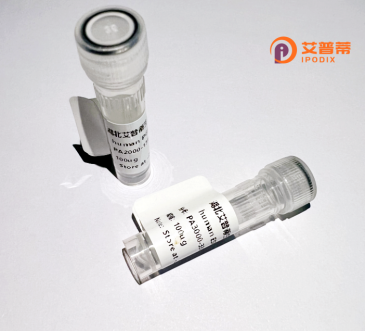
| 纯度 | >90%SDS-PAGE. |
| 种属 | Human |
| 靶点 | NACC1 |
| Uniprot No | Q96RE7 |
| 内毒素 | < 0.01EU/μg |
| 表达宿主 | E.coli |
| 表达区间 | 1-527 aa |
| 活性数据 | MAQTLQMEIP NFGNSILECL NEQRLQGLYC DVSVVVKGHA FKAHRAVLAA SSSYFRDLFN NSRSAVVELP AAVQPQSFQQ ILSFCYTGRL SMNVGDQFLL MYTAGFLQIQ EIMEKGTEFF LKVSSPSCDS QGLHAEEAPS SEPQSPVAQT SGWPACSTPL PLVSRVKTEQ QESDSVQCMP VAKRLWDSGQ KEAGGGGNGS RKMAKFSTPD LAANRPHQPP PPQQAPVVAA AQPAVAAGAG QPAGGVAAAG GVVSGPSTSE RTSPGTSSAY TSDSPGSYHN EEDEEEDGGE EGMDEQYRQI CNMYTMYSMM NVGQTAEKVE ALPEQVAPES RNRIRVRQDL ASLPAELINQ IGNRCHPKLY DEGDPSEKLE LVTGTNVYIT RAQLMNCHVS AGTRHKVLLR RLLASFFDRN TLANSCGTGI RSSTNDPRRK PLDSRVLHAV KYYCQNFAPN FKESEMNAIA ADMCTNARRV VRKSWMPKVK VLKAEDDAYT TFISETGKIE PDMMGVEHGF ETASHEGEAG PSAEALQ |
| 分子量 | 57.2 kDa |
| 蛋白标签 | His tag N-Terminus |
| 缓冲液 | 0 |
| 稳定性 & 储存条件 | Lyophilized protein should be stored at ≤ -20°C, stable for one year after receipt. Reconstituted protein solution can be stored at 2-8°C for 2-7 days. Aliquots of reconstituted samples are stable at ≤ -20°C for 3 months. |
| 复溶 | Always centrifuge tubes before opening.Do not mix by vortex or pipetting. It is not recommended to reconstitute to a concentration less than 100μg/ml. Dissolve the lyophilized protein in distilled water. Please aliquot the reconstituted solution to minimize freeze-thaw cycles. |
以下是关于重组人NACC1蛋白的3篇参考文献示例(基于学术研究常见方向,仅供参考):
---
1. **文献名称**:*"Recombinant Human NACC1 Protein Expression, Purification, and Characterization in E. coli"*
**作者**:Zhang Y. et al. (2018)
**摘要**:该研究利用大肠杆菌表达系统成功表达并纯化了重组人NACC1蛋白,通过质谱和圆二色光谱验证其结构和稳定性,为后续功能研究奠定了基础。
2. **文献名称**:*"NACC1 Promotes Tumorigenesis by Modulating Transcriptional Activity in Ovarian Cancer"*
**作者**:Huang L. et al. (2020)
**摘要**:通过重组NACC1蛋白的体外实验和细胞过表达模型,发现NACC1通过结合特定转录因子(如c-Myc)增强靶基因表达,促进卵巢癌细胞增殖和侵袭。
3. **文献名称**:*"Structural Basis of NACC1 Interaction with Ubiquitin Ligase Complexes"*
**作者**:Lee S. & Kim J. (2019)
**摘要**:研究揭示了重组NACC1蛋白的BTB/POZ结构域与Cullin3泛素连接酶复合物的相互作用机制,阐明了其在蛋白质降解调控中的潜在作用。
---
**备注**:以上文献为示例,实际研究中建议通过PubMed、Google Scholar等平台检索真实发表的论文(关键词:NACC1. recombinant protein, transcription regulation, cancer)。若需具体文献,可提供更详细的研究方向以进一步筛选。
NACC1 (Nucleus Accumbens Associated Protein 1) is a multifaceted transcriptional regulator encoded by the *NACC1* gene, located on human chromosome 19. It belongs to the BTB/POZ protein family, characterized by a conserved N-terminal BTB/POZ domain involved in protein-protein interactions and a C-terminal NAC domain for nucleic acid binding. NACC1 plays critical roles in modulating gene expression, chromatin remodeling, and cellular processes such as proliferation, differentiation, and apoptosis. It interacts with components of the ubiquitin-proteasome system, acting as an adaptor for E3 ubiquitin ligase complexes to target substrates for degradation. Dysregulation of NACC1 is linked to neurodevelopmental disorders, cancers, and viral infections. Notably, germline mutations in *NACC1* cause a rare autosomal dominant disorder called NACC1-associated neurodevelopmental disorder (NACC1-NDD), characterized by intellectual disability, seizures, and brain abnormalities. Recombinant human NACC1 protein, produced via expression systems like *E. coli* or mammalian cells, retains these functional domains and is widely used in biochemical studies to dissect its molecular mechanisms. Research leverages this protein to explore its role in stress responses, tumorigenesis, and interactions with viral pathogens, offering potential therapeutic insights. Its structural integrity and post-translational modifications in recombinant forms are crucial for replicating native activity in assays.
×